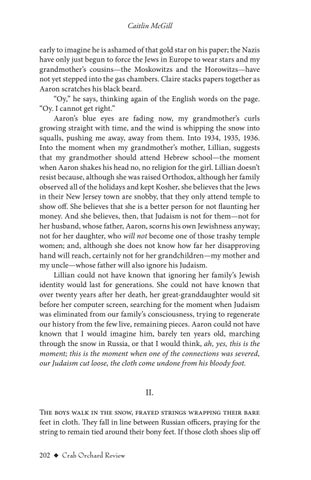Caitlin McGill early to imagine he is ashamed of that gold star on his paper; the Nazis have only just begun to force the Jews in Europe to wear stars and my grandmother’s cousins—the Moskowitzs and the Horowitzs—have not yet stepped into the gas chambers. Claire stacks papers together as Aaron scratches his black beard. “Oy,” he says, thinking again of the English words on the page. “Oy. I cannot get right.” Aaron’s blue eyes are fading now, my grandmother’s curls growing straight with time, and the wind is whipping the snow into squalls, pushing me away, away from them. Into 1934, 1935, 1936. Into the moment when my grandmother’s mother, Lillian, suggests that my grandmother should attend Hebrew school—the moment when Aaron shakes his head no, no religion for the girl. Lillian doesn’t resist because, although she was raised Orthodox, although her family observed all of the holidays and kept Kosher, she believes that the Jews in their New Jersey town are snobby, that they only attend temple to show off. She believes that she is a better person for not flaunting her money. And she believes, then, that Judaism is not for them—not for her husband, whose father, Aaron, scorns his own Jewishness anyway; not for her daughter, who will not become one of those trashy temple women; and, although she does not know how far her disapproving hand will reach, certainly not for her grandchildren—my mother and my uncle—whose father will also ignore his Judaism. Lillian could not have known that ignoring her family’s Jewish identity would last for generations. She could not have known that over twenty years after her death, her great-granddaughter would sit before her computer screen, searching for the moment when Judaism was eliminated from our family’s consciousness, trying to regenerate our history from the few live, remaining pieces. Aaron could not have known that I would imagine him, barely ten years old, marching through the snow in Russia, or that I would think, ah, yes, this is the moment; this is the moment when one of the connections was severed, our Judaism cut loose, the cloth come undone from his bloody foot.
II. The boys walk in the snow, frayed strings wrapping their bare feet in cloth. They fall in line between Russian officers, praying for the string to remain tied around their bony feet. If those cloth shoes slip off 202 u Crab Orchard Review
